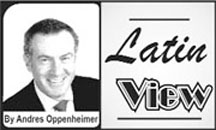What a joke! Venezuela, a country facing severe food shortages where people have to make long lines in hopes of finding milk, flour or coffee, has just received an award from the United Nations Food and Agriculture Organization for its allegedly great success in combating hunger.
 When I first read that Venezuelan President Nicolás Maduro was describing the FAO award as a historic achievement by his government, my first reaction was to think that Maduro was making this up. After all, this is the president who has said he was communicating with late president Hugo Chávez through a little bird, and who claims that Venezuela — which has the world’s highest inflation rate and Latin America’s worst performing economy — is an economic model for the rest of the world.
When I first read that Venezuelan President Nicolás Maduro was describing the FAO award as a historic achievement by his government, my first reaction was to think that Maduro was making this up. After all, this is the president who has said he was communicating with late president Hugo Chávez through a little bird, and who claims that Venezuela — which has the world’s highest inflation rate and Latin America’s worst performing economy — is an economic model for the rest of the world.
But in a telephone interview with a senior FAO official at the organization’s headquarters in Rome, I learned that the UN group had indeed bestowed the award to Venezuela and to 71 other countries at a ceremony during the 39th United Nations Conference for Food and Agriculture held last week in Rome.
Maduro’s dubiously-elected populist regime, as well as Argentina’s President Cristina Fernández de Kirchner, another of the award’s recipients, had a propaganda feast with their FAO prizes. Both countries’ official media virtually neglected to mention that the FAO also gave awards among others to Brazil, Mexico, Chile, Uruguay, Peru, Nicaragua, Costa Rica, and the Dominican Republic.
Venezuelans, who have to endure lines for hours at a time in front of supermarkets to find food, are still bewildered. Ironically, the Maduro regime itself recognizes that there are major shortages of milk, meat, chicken, coffee, rice, oil, flour, and other essential goods, which Maduro blames on an alleged “war” waged by the country’s “oligarchs.”
In Argentina, pro-government media triumphantly broadcast Fernandez speech at the FAO ceremony in Rome, where she claimed — contrary to all evidence —that her government reduced poverty to below 5 percent of the population.
What’s more, her Chief of Staff Anibal Fernandez said shortly thereafter that Argentina’s poverty rate is lower than Germany’s.
Immediately, many bewildered Argentines filled social media with jokes, many of them calling on Argentines to send food, medicines and mattresses to the supposedly poverty-stricken Germans.
In reality, Argentina’s INDEC government statistical office is known to concoct its figures. According to the Catholic University of Argentina’s Social Debt Observatory, 27 per cent of Argentina’s population is below the poverty line. Comparatively, less than 4 per cent of the German population is poor, international economists say.
In addition, because countries measure poverty in different ways, Germany defines as poor those who have an income of less than $13,164 a year, while the Argentine government considers poor those who make less than about $2,258 a year.
It seems that, in its eagerness to make headlines everywhere, the FAO gave awards to everybody, including to populist countries that — such as Venezuela and Argentina — make up their economic and social statistics, and that have misspent their recent all-time commodity bonanzas in populist fiestas that wrecked their economies.
In a telephone interview from Rome, I asked FAO chief statistician Pietro Gennari whether the FAO is not being utterly irresponsible by giving awards to the governments of Venezuela and Argentina.
Gennari responded that the FAO gave these awards taking into account countries’ achievements in the fight against hunger since 2000. In addition, in the case of Venezuela, many of these awards were given based on statistics that are up to three years old.
“We base our estimates on data that are provided by the countries, and by their national statistical authorities,” Gennari told me. “These estimates, as it happens, sometimes are a bit outdated. It’s not possible to take into account the latest developments in each country.”
My opinion: Oh, really? You give an award to a government that is responsible for widespread food shortages, and your excuse is that you based your information on that country’s notoriously unreliable statistical office? And you accept dubious government statistics that are often three years old because the country has stopped publishing them altogether for fear of public ridicule?
The FAO (just like the UN Human Rights Council, which counts Cuba, China and Saudi Arabia among its members) makes it hard to take UN agencies seriously. According to the UN’s own statistics, Venezuela is Latin America’s worst performing economy, followed by Argentina.
Giving awards to the Venezuelan and Argentine governments amounts to rewarding those who make up their statistics, as virtually any independent economist in Venezuela or Argentina can attest. What the UN agency does is not only irresponsible, it’s scandalous: it validates disastrous governments and encourages other countries to pursue policies that create more — rather than less — hunger.
© The Miami Herald, 2015. Distributed by Tribune Media Services.









